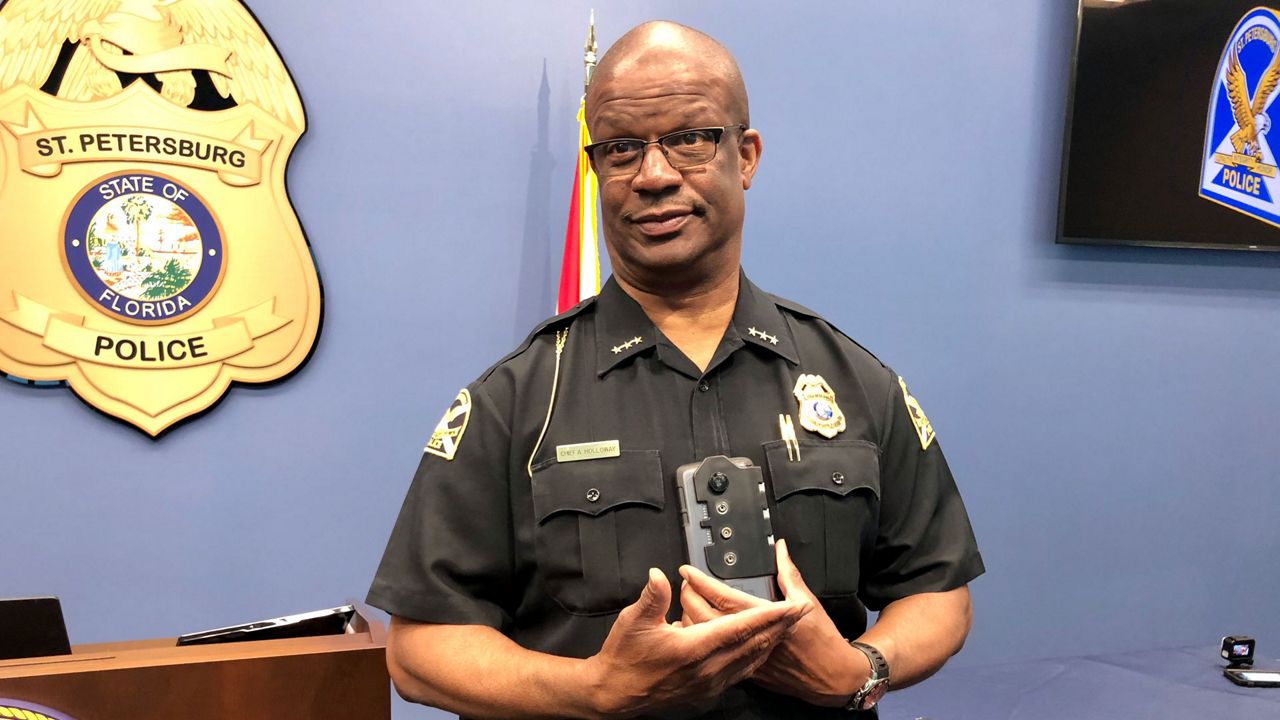ST. PETERSBURG, Fla. — St. Petersburg Police Chief Tony Holloway unveiled on Wednesday the type of body camera his agency will begin field testing in April, and said if that pilot program is successful he’ll make a recommendation to the City to fund the technology.
- Agency testing BodyWorn brand of body cameras
- Chief Holloway: Privacy concerns factored into which type of camera to test
- More Pinellas County stories
“We’ll wear them for 45 days. We’ll see how they operate in the field,” said Holloway. “We want to be done with this by the end of the year. Giving the Mayor the recommendation on how the camera works and the most big and important thing is how much is this going to cost.”
Holloway added he expects the initial cost to be more than $1 million with recurring costs for storage and maintenance.
Not always recording?
The agency is working with a brand named BodyWorn, which features a camera that looks like a cell phone and is worn on the center front of an officer’s uniform. It also comes with a wristband that can activate the camera.
Holloway said he likes the fact that the body camera is automatically activated when an officer pulls their weapon.
“When the officer pulls his or her weapon, the camera will be activated. So, the officer doesn’t have to worry about 'did I turn it on? Did I turn it off?'" he said. “It can record up to two minutes prior to the officer pulling his weapon.”
Holloway said those features will help save a lot of money on video storage, one reason it has taken him more than five years to support body cameras for his 450 uniformed officers.
“I was always for body cameras. The only thing that changed my mind was we finally got what we’re looking for because the biggest thing was storage,” he said. “We did not want to have something where it’s on for eight hours a day.”
Identifying the "crucial moment"
A lack of recording is the exact reason that civil rights leader, Sevell Brown III, 69, with the National Christian League of Councils said he’s against that particular brand of body cameras.
Brown called the devices “death gun cameras” because they’re only automatically activated when an officer pulls their weapon.
“We want the body cams to be rolling when an officer is basically called to arrive at a call of urgency,” he said. “[Holloway] thinks that he can pass it off to the American public and citizens of St. Petersburg with a compromise of a two-minute roll. That is unacceptable.”
Holloway said privacy concerns for residents is another reason he’s opposed to a body camera that’s always recording.
“What is the crucial moment? And when we talked to everybody, that crucial moment was when that officer pulled his or her weapon,” he said. “You want to know what happened? You want to know why that officer pulled that weapon? So, that’s what we want to capture.”
Holloway said the agency has already built trust in the community and the only thing body cameras will do is help the department be more transparent during use-of-force incidents. According to St. Petersburg Police Records, there were 843 use-of-force incidents in 2019 and there was only one citizen complaint of unnecessary force.
The Gulfport Police Department is the only agency in Pinellas County that’s currently using body cameras.



